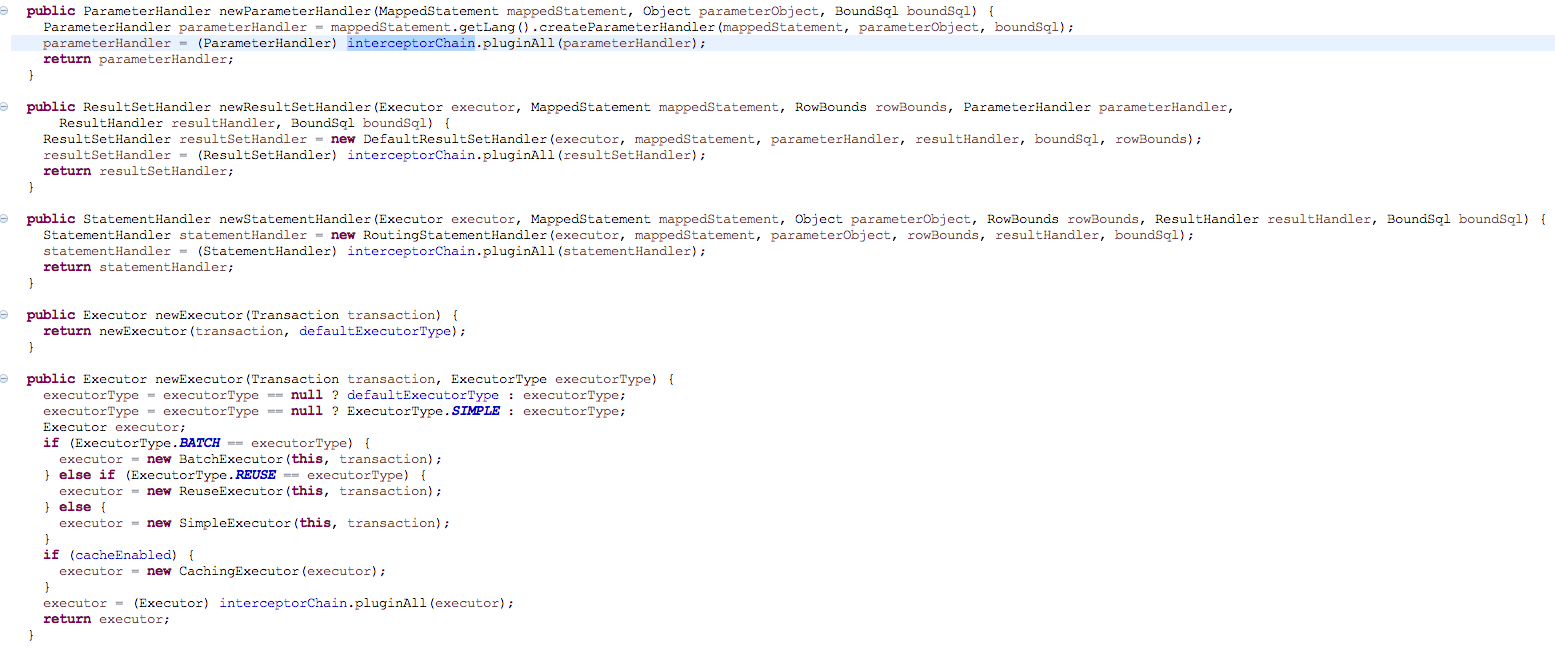今天和大家分享下mybatis的一个分页插件PageHelper,在讲解PageHelper之前我们需要先了解下mybatis的插件原理。PageHelper
的官方网站:https://github.com/pagehelper/Mybatis-PageHelper
一、Plugin接口
mybatis定义了一个插件接口org.apache.ibatis.plugin.Interceptor,任何自定义插件都需要实现这个接口PageHelper就实现了改接口
package org.apache.ibatis.plugin;
import java.util.Properties;
/**
* @author Clinton Begin
*/
public interface Interceptor {
Object intercept(Invocation invocation) throws Throwable;
Object plugin(Object target);
void setProperties(Properties properties);
}1:intercept 拦截器,它将直接覆盖掉你真实拦截对象的方法。
2:plugin方法它是一个生成动态代理对象的方法
3:setProperties它是允许你在使用插件的时候设置参数值。
看下com.github.pagehelper.PageHelper分页的实现了那些
/**
* Mybatis拦截器方法
*
* @param invocation 拦截器入参
* @return 返回执行结果
* @throws Throwable 抛出异常
*/
public Object intercept(Invocation invocation) throws Throwable {
if (autoRuntimeDialect) {
SqlUtil sqlUtil = getSqlUtil(invocation);
return sqlUtil.processPage(invocation);
} else {
if (autoDialect) {
initSqlUtil(invocation);
}
return sqlUtil.processPage(invocation);
}
}
这个方法获取了是分页核心代码,重新构建了BoundSql对象下面会详细分析
/**
* 只拦截Executor
*
* @param target
* @return
*/
public Object plugin(Object target) {
if (target instanceof Executor) {
return Plugin.wrap(target, this);
} else {
return target;
}
}这个方法是正对Executor进行拦截
/**
* 设置属性值
*
* @param p 属性值
*/
public void setProperties(Properties p) {
checkVersion();
//多数据源时,获取jdbcurl后是否关闭数据源
String closeConn = p.getProperty("closeConn");
//解决#97
if(StringUtil.isNotEmpty(closeConn)){
this.closeConn = Boolean.parseBoolean(closeConn);
}
//初始化SqlUtil的PARAMS
SqlUtil.setParams(p.getProperty("params"));
//数据库方言
String dialect = p.getProperty("dialect");
String runtimeDialect = p.getProperty("autoRuntimeDialect");
if (StringUtil.isNotEmpty(runtimeDialect) && runtimeDialect.equalsIgnoreCase("TRUE")) {
this.autoRuntimeDialect = true;
this.autoDialect = false;
this.properties = p;
} else if (StringUtil.isEmpty(dialect)) {
autoDialect = true;
this.properties = p;
} else {
autoDialect = false;
sqlUtil = new SqlUtil(dialect);
sqlUtil.setProperties(p);
}
}基本的属性设置
二、Plugin初始化
初始化和所有mybatis的初始化一样的在之前的文章里面已经分析了 《Mybatis源码分析之SqlSessionFactory(一)》
private void pluginElement(XNode parent) throws Exception {
if (parent != null) {
for (XNode child : parent.getChildren()) {
String interceptor = child.getStringAttribute("interceptor");
Properties properties = child.getChildrenAsProperties();
Interceptor interceptorInstance = (Interceptor) resolveClass(interceptor).newInstance();
interceptorInstance.setProperties(properties);
configuration.addInterceptor(interceptorInstance);
}
}
}这里是讲多个实例化的插件对象放入configuration,addInterceptor最终存放到一个list里面的,以为这可以同时存放多个Plugin
三、Plugin拦截
插件可以拦截mybatis的4大对象ParameterHandler、ResultSetHandler、StatementHandler、Executor,源码如下图
在Configuration类里面可以找到

PageHelper使用了Executor进行拦截,上面的的源码里面已经可以看到了。
我看下上图newExecutor方法
executor = (Executor) interceptorChain.pluginAll(executor);
这个是生产一个代理对象,生产了代理对象就运行带invoke方法
四、Plugin运行
mybatis自己带了Plugin方法,源码如下
public class Plugin implements InvocationHandler {
private Object target;
private Interceptor interceptor;
private Map<Class<?>, Set<Method>> signatureMap;
private Plugin(Object target, Interceptor interceptor, Map<Class<?>, Set<Method>> signatureMap) {
this.target = target;
this.interceptor = interceptor;
this.signatureMap = signatureMap;
}
public static Object wrap(Object target, Interceptor interceptor) {
Map<Class<?>, Set<Method>> signatureMap = getSignatureMap(interceptor);
Class<?> type = target.getClass();
Class<?>[] interfaces = getAllInterfaces(type, signatureMap);
if (interfaces.length > 0) {
return Proxy.newProxyInstance(
type.getClassLoader(),
interfaces,
new Plugin(target, interceptor, signatureMap));
}
return target;
}
@Override
public Object invoke(Object proxy, Method method, Object[] args) throws Throwable {
try {
Set<Method> methods = signatureMap.get(method.getDeclaringClass());
if (methods != null && methods.contains(method)) {
return interceptor.intercept(new Invocation(target, method, args));
}
return method.invoke(target, args);
} catch (Exception e) {
throw ExceptionUtil.unwrapThrowable(e);
}
}
private static Map<Class<?>, Set<Method>> getSignatureMap(Interceptor interceptor) {
Intercepts interceptsAnnotation = interceptor.getClass().getAnnotation(Intercepts.class);
// issue #251
if (interceptsAnnotation == null) {
throw new PluginException("No @Intercepts annotation was found in interceptor " + interceptor.getClass().getName());
}
Signature[] sigs = interceptsAnnotation.value();
Map<Class<?>, Set<Method>> signatureMap = new HashMap<Class<?>, Set<Method>>();
for (Signature sig : sigs) {
Set<Method> methods = signatureMap.get(sig.type());
if (methods == null) {
methods = new HashSet<Method>();
signatureMap.put(sig.type(), methods);
}
try {
Method method = sig.type().getMethod(sig.method(), sig.args());
methods.add(method);
} catch (NoSuchMethodException e) {
throw new PluginException("Could not find method on " + sig.type() + " named " + sig.method() + ". Cause: " + e, e);
}
}
return signatureMap;
}
private static Class<?>[] getAllInterfaces(Class<?> type, Map<Class<?>, Set<Method>> signatureMap) {
Set<Class<?>> interfaces = new HashSet<Class<?>>();
while (type != null) {
for (Class<?> c : type.getInterfaces()) {
if (signatureMap.containsKey(c)) {
interfaces.add(c);
}
}
type = type.getSuperclass();
}
return interfaces.toArray(new Class<?>[interfaces.size()]);
}
}wrap方法是为了生成一个动态代理类。
invoke方法是代理绑定的方法,该方法首先判定签名类和方法是否存在,如果不存在则直接反射调度被拦截对象的方法,如果存在则调度插件的interceptor方法,这时候会初始化一个Invocation对象
我们在具体看下PageHelper,当执行到invoke后程序将跳转到PageHelper.intercept
public Object intercept(Invocation invocation) throws Throwable {
if (autoRuntimeDialect) {
SqlUtil sqlUtil = getSqlUtil(invocation);
return sqlUtil.processPage(invocation);
} else {
if (autoDialect) {
initSqlUtil(invocation);
}
return sqlUtil.processPage(invocation);
}
}我们在来看sqlUtil.processPage方法
/**
* Mybatis拦截器方法,这一步嵌套为了在出现异常时也可以清空Threadlocal
*
* @param invocation 拦截器入参
* @return 返回执行结果
* @throws Throwable 抛出异常
*/
public Object processPage(Invocation invocation) throws Throwable {
try {
Object result = _processPage(invocation);
return result;
} finally {
clearLocalPage();
}
}继续跟进
/**
* Mybatis拦截器方法
*
* @param invocation 拦截器入参
* @return 返回执行结果
* @throws Throwable 抛出异常
*/
private Object _processPage(Invocation invocation) throws Throwable {
final Object[] args = invocation.getArgs();
Page page = null;
//支持方法参数时,会先尝试获取Page
if (supportMethodsArguments) {
page = getPage(args);
}
//分页信息
RowBounds rowBounds = (RowBounds) args[2];
//支持方法参数时,如果page == null就说明没有分页条件,不需要分页查询
if ((supportMethodsArguments && page == null)
//当不支持分页参数时,判断LocalPage和RowBounds判断是否需要分页
|| (!supportMethodsArguments && SqlUtil.getLocalPage() == null && rowBounds == RowBounds.DEFAULT)) {
return invocation.proceed();
} else {
//不支持分页参数时,page==null,这里需要获取
if (!supportMethodsArguments && page == null) {
page = getPage(args);
}
return doProcessPage(invocation, page, args);
}
}
这些都只是分装page方法,真正的核心是doProcessPage
/**
* Mybatis拦截器方法
*
* @param invocation 拦截器入参
* @return 返回执行结果
* @throws Throwable 抛出异常
*/
private Page doProcessPage(Invocation invocation, Page page, Object[] args) throws Throwable {
//保存RowBounds状态
RowBounds rowBounds = (RowBounds) args[2];
//获取原始的ms
MappedStatement ms = (MappedStatement) args[0];
//判断并处理为PageSqlSource
if (!isPageSqlSource(ms)) {
processMappedStatement(ms);
}
//设置当前的parser,后面每次使用前都会set,ThreadLocal的值不会产生不良影响
((PageSqlSource)ms.getSqlSource()).setParser(parser);
try {
//忽略RowBounds-否则会进行Mybatis自带的内存分页
args[2] = RowBounds.DEFAULT;
//如果只进行排序 或 pageSizeZero的判断
if (isQueryOnly(page)) {
return doQueryOnly(page, invocation);
}
//简单的通过total的值来判断是否进行count查询
if (page.isCount()) {
page.setCountSignal(Boolean.TRUE);
//替换MS
args[0] = msCountMap.get(ms.getId());
//查询总数
Object result = invocation.proceed();
//还原ms
args[0] = ms;
//设置总数
page.setTotal((Integer) ((List) result).get(0));
if (page.getTotal() == 0) {
return page;
}
} else {
page.setTotal(-1l);
}
//pageSize>0的时候执行分页查询,pageSize<=0的时候不执行相当于可能只返回了一个count
if (page.getPageSize() > 0 &&
((rowBounds == RowBounds.DEFAULT && page.getPageNum() > 0)
|| rowBounds != RowBounds.DEFAULT)) {
//将参数中的MappedStatement替换为新的qs
page.setCountSignal(null);
BoundSql boundSql = ms.getBoundSql(args[1]);
args[1] = parser.setPageParameter(ms, args[1], boundSql, page);
page.setCountSignal(Boolean.FALSE);
//执行分页查询
Object result = invocation.proceed();
//得到处理结果
page.addAll((List) result);
}
} finally {
((PageSqlSource)ms.getSqlSource()).removeParser();
}
//返回结果
return page;
}
上面的有两个 Object result = invocation.proceed()执行,第一个是执行统计总条数,第二个是执行执行分页的查询的数据
里面用到了代理。最终第一回返回一个总条数,第二个把分页的数据得到。
五:PageHelper使用
以上讲解了Mybatis的插件原理和PageHelper相关的内部实现,下面具体讲讲PageHelper使用
1:先增加maven依赖:
<dependency> <groupId>com.github.pagehelper</groupId> <artifactId>pagehelper</artifactId> <version>4.1.6</version> </dependency
2:配置configuration.xml文件加入如下配置(plugins应该在environments的上面 )
<plugins> <!-- PageHelper4.1.6 --> <plugin interceptor="com.github.pagehelper.PageHelper"> <property name="dialect" value="mysql"/> <property name="offsetAsPageNum" value="false"/> <property name="rowBoundsWithCount" value="false"/> <property name="pageSizeZero" value="true"/> <property name="reasonable" value="false"/> <property name="supportMethodsArguments" value="false"/> <property name="returnPageInfo" value="none"/> </plugin> </plugins>
相关字段说明可以查看SqlUtilConfig源码里面都用说明
注意配置的时候顺序不能乱了否则报错
Caused by: org.apache.ibatis.builder.BuilderException: Error creating document instance. Cause: org.xml.sax.SAXParseException; lineNumber: 57; columnNumber: 17; 元素类型为 "configuration" 的内容必须匹配 "(properties?,settings?,typeAliases?,typeHandlers?,objectFactory?,objectWrapperFactory?,plugins?,environments?,databaseIdProvider?,mappers?)"。 at org.apache.ibatis.parsing.XPathParser.createDocument(XPathParser.java:259) at org.apache.ibatis.parsing.XPathParser.<init>(XPathParser.java:120) at org.apache.ibatis.builder.xml.XMLConfigBuilder.<init>(XMLConfigBuilder.java:66) at org.apache.ibatis.session.SqlSessionFactoryBuilder.build(SqlSessionFactoryBuilder.java:49) ... 2 more
意思是配置里面的节点顺序是properties->settings->typeAliases->typeHandlers->objectFactory->objectWrapperFactory->plugins->environments->databaseIdProvider->mappers plugins应该在environments之前objectWrapperFactory之后 这个顺序不能乱了
3:具体使用
1:分页
SqlSession sqlSession = sessionFactory.openSession(); UserMapper userMapper = sqlSession.getMapper(UserMapper.class); PageHelper.startPage(1,10,true); //第一页 每页显示10条 Page<User> page=userMapper.findUserAll();
2:不分页
PageHelper.startPage(1,-1,true);
3:查询总条数
PageInfo<User> info=new PageInfo<>(userMapper.findUserAll());